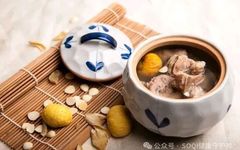Many people believe that maintaining health requires spending a lot of money on expensive supplements. In fact, health maintenance can be achieved in everyday life using common ingredients to achieve nourishing effects, which is often referred to as “food and medicine share the same source.” This article summarizes dietary recommendations for common physical discomforts such as strengthening the spleen and stomach, preventing colds, and alleviating fatigue from staying up late throughout the four seasons, for your reference!
Strengthening the Spleen and Stomach
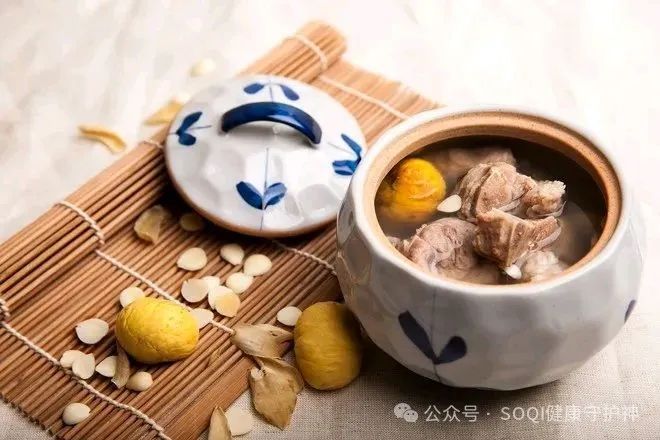
1. Chestnut and Sweet Potato Soup: Tonifies Qi and Strengthens the Spleen
As the saying goes, “Pears and jujubes in August, hawthorn in September, and chestnuts in October bring joy.” Chestnut and sweet potato soup with pork ribs tonifies Qi and strengthens the spleen, strengthens bones, invigorates blood, regulates lipids, and promotes bowel movements and detoxification.
Method
Prepare chestnuts, sweet potatoes, pork ribs, red dates, and ginger slices. Boil 8 bowls of water, add the pork ribs, chestnuts, red dates, and ginger slices, boil on high heat for 20 minutes, then simmer on low heat for 1 hour. Add sweet potato chunks and simmer for another 20 minutes, then season with salt to taste before serving.
2. Peanut and Red Date Soup: Improves Physical Weakness
Many middle-aged and elderly people often ask what to eat in winter to nourish the spleen and stomach. For those with Yang deficiency, who often have cold hands and feet and cannot tolerate the cold, it is beneficial to drink peanut and red date beef soup.
Method
Beef is rich in protein, which can enhance the body’s resistance to disease and effectively nourish the blood with low fat content. In TCM, peanuts can harmonize the spleen and stomach, nourish and stop bleeding, suitable for those with malnutrition and spleen-stomach disharmony. For those with excessive gastric acid and cold stomach, peanuts can reduce gastric acid secretion and prevent ulcers.
3. Red Date and Yam Porridge: Nourishes the Spleen and Lung
Yam contains a lot of mucoproteins and enzymes that can promote digestion and strengthen the spleen and stomach. Eating yam provides excellent protection for the stomach. Additionally, it nourishes the spleen and lung.
Method
For red date and yam porridge, add yam chunks or slices when cooking the porridge, along with a few red dates. This dish is most suitable for children and the elderly, as both groups may have weaker teeth and digestive systems, making yam porridge easier to digest. Additionally, those with spleen and stomach weakness or indigestion can also benefit from yam porridge.
Supporting Blood Pressure Improvement
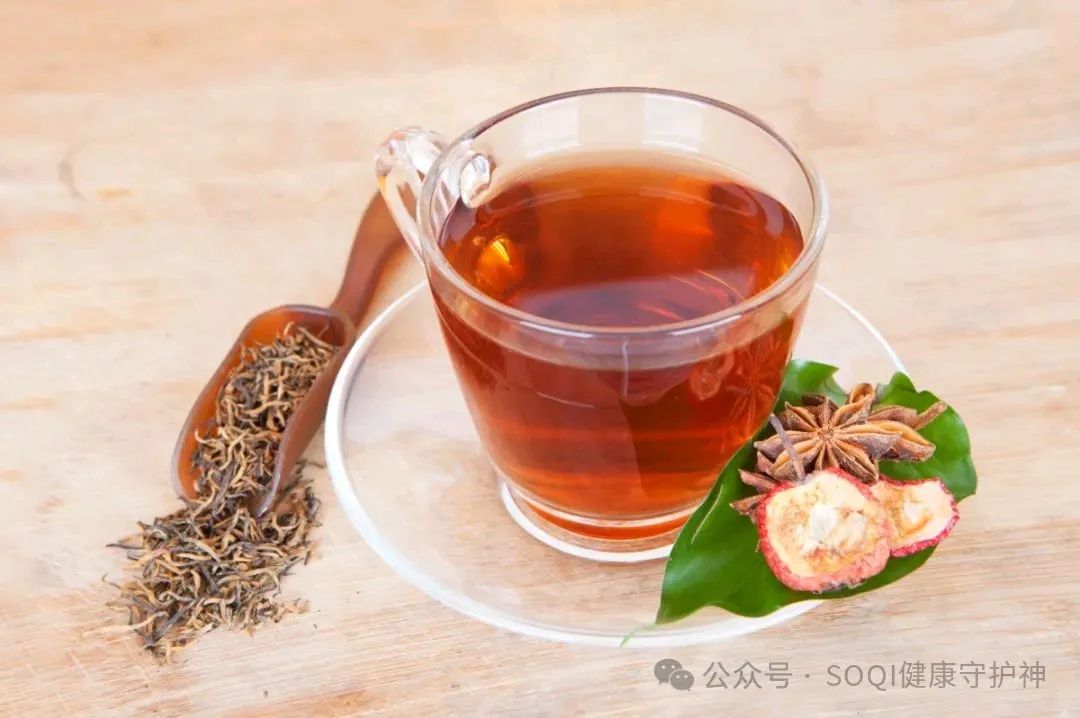
1. Mulberry Leaf Tea: Nourishes the Kidney and Blood
Mulberry leaf is a key agent for nourishing the kidney and blood. Clinical studies show that using mulberry leaf decoction as tea has significant auxiliary effects in treating hypertension.
Method
Take 15 grams of dried mulberry leaves, decoct for 15 minutes, and drink twice daily.
2. Corn Silk Tea: Assists in Lowering Blood Pressure
Corn silk not only has the effect of lowering blood pressure but also has benefits for stopping diarrhea, stopping bleeding, diuresis, and nourishing the stomach. In clinical practice, corn silk is particularly effective for treating edema and hypertension caused by nephritis.
Method
Steep in tea and drink several times a day, using 25-30 grams each time.
3. Hawthorn Tea: Lowers Blood Pressure
The components in hawthorn can aid digestion, dilate blood vessels, lower blood sugar, and reduce blood pressure. Regular consumption of hawthorn tea has significant auxiliary effects in treating hypertension.
Method
Steep 1-2 fresh hawthorn fruits in tea several times a day.
Autumn Lung Moistening and Dryness Prevention
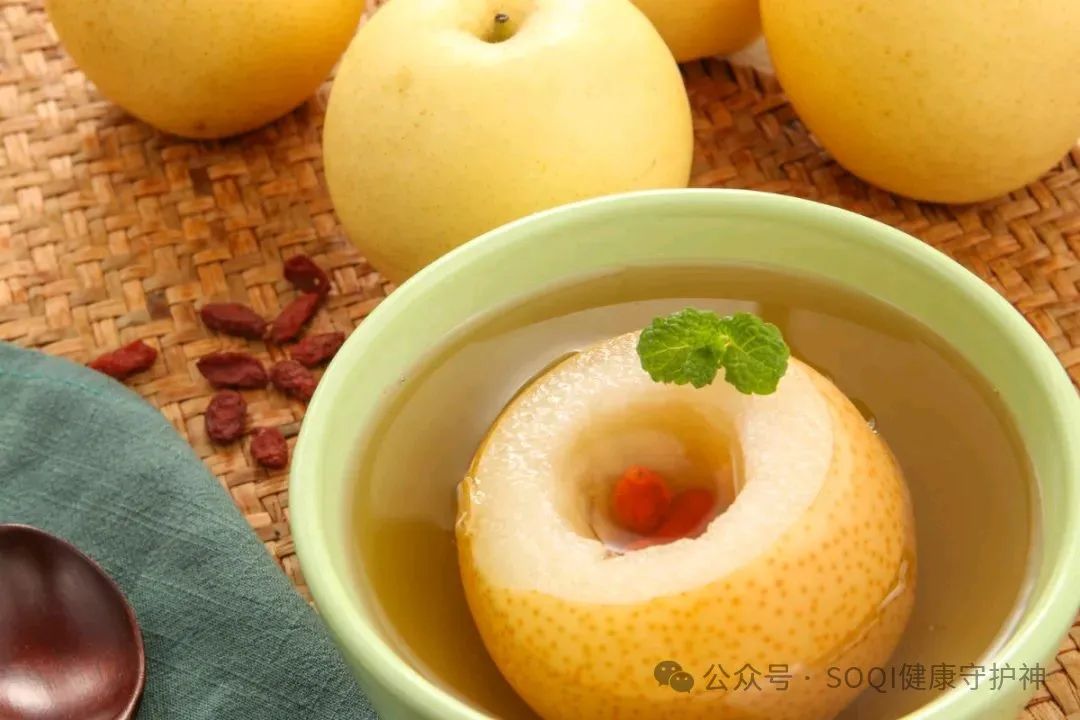
1. Lily and Snow Pear Stew: Moistens the Lung and Clears Heat
Autumn lilies are rich in vitamins, alkaloids, lily glycosides, and dietary fiber, which together can hydrate and clear heat. There are both fresh and dried lilies, with fresh lilies being in season in autumn.
Method
Put the lily and the water used to soak the lily into a pot (preferably a clay pot). When the water is about to boil, add a piece of rock sugar and the peeled and diced snow pear, then stew for about half an hour to create a nourishing dessert that moistens the lungs.
2. Lotus Root Juice: Alleviates Dry Mouth
Raw lotus root can be eaten in salads or juiced, and can also be combined with fresh pears and sugarcane for juicing, especially suitable for symptoms of thirst and irritability.
Method
For raw consumption, wash and peel the lotus root; cooked lotus root can strengthen the spleen, open the appetite, stop diarrhea, and consolidate essence.
3. Five Juice Drink: Moistens the Lung and Stops Cough
During the transition of seasons in spring, many people experience symptoms of dry mouth, angular cheilitis, dry skin, and constipation. At this time, it is important to prevent dryness and moisten the lungs. TCM believes that the lungs prefer moisture and dislike dryness, so it is advisable to consume moistening foods such as raw pears, water chestnuts, pomelo, tremella, and sugarcane.
Method
The “Five Juice Drink” is a classic health tea, combining equal parts of pear juice, water chestnut juice, fresh reed root juice, ophiopogon juice, and lotus root juice. Place the five juices in a pot, add an appropriate amount of water, bring to a boil over high heat, then simmer for 30 minutes on low heat to achieve the effect of moistening the lungs and stopping cough.
Improving Immunity and Preventing Colds

1. Kumquat and Snow Pear Stew: Stops Cough and Prevents Colds
Kumquats are not only seasonal fruits in autumn but also serve as “natural medicine” with health benefits. TCM believes that kumquats have the effects of generating fluids, quenching thirst, resolving phlegm, soothing the throat, and regulating Qi and digestion.
Method
Snow pears are known as a fruit that stops cough; when stewed with kumquats, it becomes a natural remedy for cough.
2. Lamb and Radish Soup: Boosts Immunity
White radish has the effects of promoting Qi, aiding digestion, detoxifying, and moistening the lungs. Lamb can ward off wind and cold while also nourishing the body. Consuming lamb and radish soup appropriately can enhance the body’s immunity, particularly beneficial for the elderly with frequent nighttime urination, cold intolerance, and cold extremities due to Yang deficiency. It can also be used for postpartum Qi and blood deficiency and abdominal pain due to cold.
Method
Cut the lamb into pieces and place it in cold water, gradually heating it. After boiling, remove the lamb; then add hot water along with scallions, ginger, and star anise to stew. Add radish when nearly cooked.
3. Scallion White Water: Alleviates Nasal Congestion and Headache
Scallion white is the bulbous part near the root of the scallion and is the main medicinal part of the scallion. In TCM, it is a common remedy for treating external wind-cold. Scallion white porridge and scallion soup are commonly used. Using scallion white to treat wind-cold can relieve nasal congestion and help alleviate headaches caused by colds.
Method
Chop 15 grams of scallion white, boil in water for about 5 minutes, and then consume. It is suitable for wind-cold colds, headaches, and nasal congestion. If the wind-cold is severe, you can add a few slices of ginger and a little dried tangerine peel to boil together.
Alleviating Fatigue from Staying Up Late
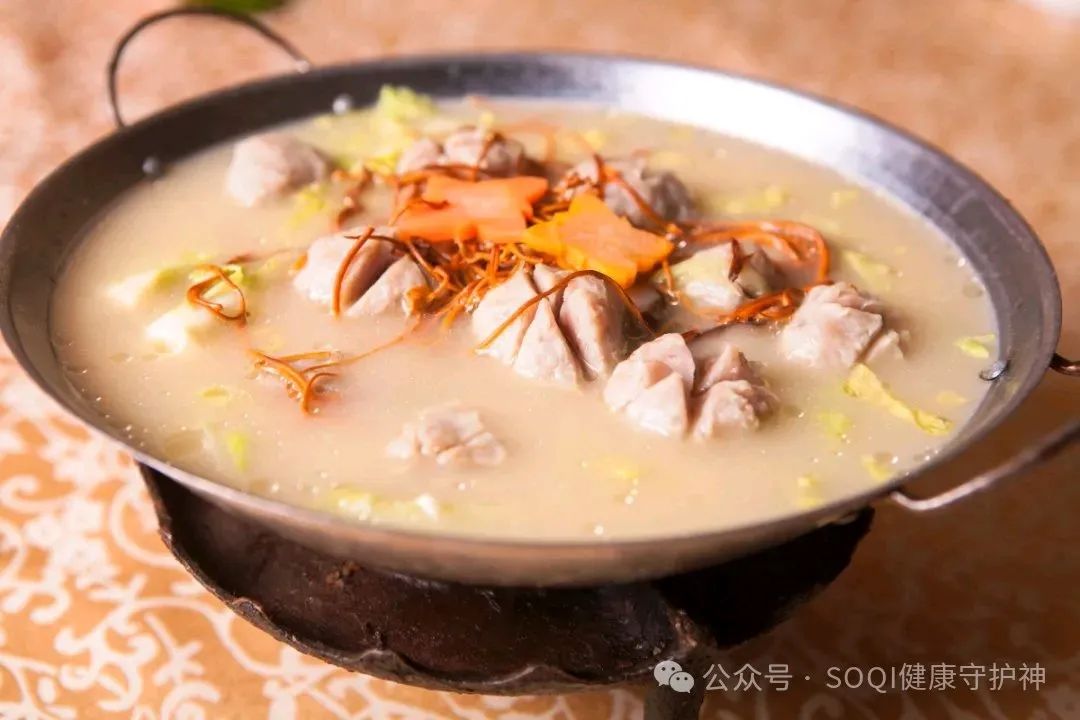
1. Lotus Seed and Lean Meat Soup: Calms the Heart and Settles the Spirit
Lotus seeds have a supportive effect on the heart and spirit. When combined with lily and lean meat, the effect is even better. For those who often stay up late, this can be used to nourish, calm the heart, and relieve psychological stress, reducing fatigue after staying up late.
Method
When making the soup, first wash the lily and lotus seeds, soak them in warm water, then add shredded lean meat after cooking, and simmer to make the soup.
2. Goji Berry and Chrysanthemum Tea: Clears Heat and Nourishes Yin
There is a saying that goji berries and chrysanthemums are a natural pair. Goji berries nourish the liver and kidneys, benefiting vision, while chrysanthemums nourish liver Yin, pacify liver Yang, and clear liver fire. Staying up late can easily damage Yin and cause heat; goji berries nourish liver and kidney Yin and blood, while chrysanthemums can clear heat and nourish Yin, making them suitable for those who stay up late.
Method
Steep goji berries and chrysanthemums in tea.
3. Ginseng and Glutinous Rice Porridge: Tonifies and Resists Fatigue
During late-night hours, the brain’s oxygen demand and consumption increase, leading to fatigue. At this time, consuming ginseng and glutinous rice porridge can help tonify vital energy and resist fatigue.
Method
Slice 10 grams of ginseng and cook it with 50 grams each of yam and glutinous rice. Once the porridge is ready, add an appropriate amount of brown sugar and consume warm, once a day. Avoid drinking tea or coffee while eating.

